Helping Pets Feel Safe & Loved
Fear Free is a new approach to veterinary medicine focused on reducing the stress and anxiety that a our furry companions feel during veterinary visits.
This is important for a number of reasons. First and foremost, heightened stress levels alter your pet’s physiology, affecting their blood pressure, heart rate, and body temperature.
Veterinarians rely on these systems to diagnose health issues. Stress can have a profound impact on these test results and more, making it difficult to know whether there is an underlying problem.
Also, many pet parents delay bringing their pet in for examinations when they sense their dog or cat has a large fear response. This protective behaviour is understandable but can jeopardize the health of your pet.

Fear-Free Professional Certification
Our Fear-Free Certified team members have undergone extensive training on how to create a calm and welcoming environment for our patients and how to recognize when a pet is feeling fearful or anxious.
As a Fear Free Certified Professional, each member of you're veterinary team will their best to:
- Reduce or remove anxiety triggers that can cause pets to become fearful at home, in transport, and at the veterinary hospital.
- Help provide owners with the tools necessary to safely and comfortably transport their pets to the hospital.
How We Implement Fear Free
Fear Free principles extend throughout our hospital and we prioritize them second only to the medical care of our patients. We implement the following elements into each visit:
- Good Communication Between Pets & People
We start by understanding and identifying how dogs and cats communicate signs of stress to us.
These signs can be subtle or obvious, from a tense expression or dilated pupils to growling, hissing or a tucked tail – just to name a few.
We also discuss your pet's known stressors with the owner, which can include sounds, scents, discomfort, disease processes and unfamiliar people.
Getting to know our canine and feline clients and understanding what stresses them out, and how they communicate that stress, helps us better manage it during their visits.
We ask the family to speak up if there is something that causes fear, anxiety or stress (FAS). We can help!
- Planning Ahead
An anxiety-free veterinary appointment starts at home. Let us know if your pet gets stressed going to the veterinarian. We can offer suggestions for things to do at home before the visit. There may be options to send supplements or medication home before the visit to help with car sickness or to help decrease the level of stress at the veterinarian.
If your companion gets stressed coming into the lobby, meeting new people or encountering other animals, we can have you wait in the car or in our outside waiting area, and then come directly into the exam room.
Cats and small dogs should be acclimated to their carriers ahead of the visit. This can be accomplished by leaving the carrier out in an area of your home where your pet likes to be. Place a towel over the top of the carrier to help create a safe place with familiar scents.
The carrier should also be outfitted with toys, and comfortable bedding or a non-slip mat. Carriers that have a top-off option are ideal because they are more accessible.
If transporting a medium to large dog, be sure to use an approved restraint device in the car. The drive to the veterinarian can be kept low-stress with calm music or silence and by avoiding hard stops or starts.
We also suggest bringing your pet's favourite treats or toys to the visit.
- Treats
To encourage a positive experience and decrease fear, stress and anxiety during the visit, rewards such as treats or petting/brushing can be used during an exam or when obtaining diagnostics as long as it is not contraindicated based on why your pet is at the hospital.
We have treats throughout the hospital, but if your cat or dog is on a special diet, we encourage you to bring their treats or food with you to the visit.
- Pet Parent Involvement
Families are allowed to be with their pets during procedures (excluding sedation, anesthesia, X-rays and while the hospital is closed). The staff will direct families on how they can play a part in their dog, cat or small exotic's treatment to ensure lower stress for your pet and to keep staff and family safe during the procedure.
- Sedation & Restraint Options
If restraint is required during a procedure, our trained staff may use a towel wrap, a muzzle or an Elizabethan collar to ensure the patient is safe and comfortable during the process. A mild sedative may be recommended to make sure that the procedure can be performed safely and is less stressful for the patient.
If you already know that your pet experiences anxiety or stress when visiting the veterinarian, it may be beneficial for the veterinarian to provide you with a mild sedative to give to your pet at home prior to an appointment.
In some cases, we will reschedule a procedure if your pet is stressed. This allows us to send home medications before performing the procedures.

